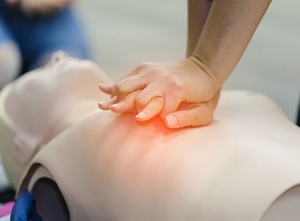
Damar Hamlin, NFL player for the Buffalo Bills, just announced that he is medically cleared to return to play and is with his team as they start offseason training. Hamlin also confirmed that his medical diagnosis from that fateful game on January 2nd, that caused his cardiac arrest, was commotio cordis.
We asked Matthew Martinez, MD, director of Atlantic Health System Sports Cardiology at Morristown Medical Center, to explain more about this rare condition.
Commotio cordis overview
“Commotio cordis is related to ventricular fibrillation, when the heart completely stops,” says Dr. Martinez. “It’s the result of traumatic chest-wall impact.”
Normally, the heart has a certain level of electricity pass through it, creating a regular heart rhythm. With commotio cordis, impact to the chest (for example, getting hit with a flying object) causes more electricity to move through the heart. This extra electricity throws off the heart’s rhythm and can stop the heart, which is called cardiac arrest.
Who’s at risk of commotio cordis?
Commotio cordis is rare (fewer than 30 cases per year). And it can happen to anyone. For commotio cordis to result in cardiac arrest, the trauma to the chest must happen at the right time and in the right spot.
“This is a poorly timed event,” explains Dr. Martinez. “It lands at a time when the heart is vulnerable to being put in cardiac arrest—what we call ‘on the T Wave,’ when the heart is resetting itself.”
Athletes who play sports like baseball or lacrosse are at a higher risk of experiencing trauma to the chest. But, according to Dr. Martinez, there’s no screening process that can identify someone at risk for commotio cordis.
What are the symptoms of commotio cordis?
Commotio cordis causes abnormal heart rhythm and cardiac arrest. After someone gets hit in the chest, they may collapse and go unconscious. There’s no test to confirm that someone experienced commotio cordis.
“It’s a diagnosis of exclusion,” says Dr. Martinez. To diagnose someone with commotio cordis, doctors see if there was trauma to the chest and if the heart was normal before and after the trauma. They also rule out other possible causes of cardiac arrest.
What is commotio cordis treatment?
“Shocking someone back into normal rhythm is the only successful way to undo a blunt trauma to the chest, or commotio cordis,” explains Dr. Martinez. “Any bystander who witnesses someone going into cardiac arrest should call 911, start cardiopulmonary resuscitation (CPR), use an automatic external defibrillator (AED) and keep going until emergency services arrive.”
To increase chances of survival, CPR and use of an AED must happen as soon as possible.
Cardiac arrest vs. heart attack
Many people assume cardiac arrest means the same as a heart attack, but they are two different conditions.
- Cardiac arrest happens when there’s an error in the heart’s electrical signals, and the heart stops working correctly. There are many causes of cardiac arrest, including commotio cordis.
- A heart attack happens when blood can’t flow to the heart, typically caused by a blockage. The lack of blood flow causes tissue in the heart to die.
Both conditions result in medical emergencies that require different treatments. In either case, call 911. If the person is unresponsive, immediately start CPR to keep blood flowing.
Be Proactive About Heart Health
Stay up to date with your annual visits to prevent and detect more serious issues and learn about risk factors for heart disease.
Related Articles
Five Reasons to Connect With Your Primary Care Doctor
Keeping up with your heart health begins with your primary care doctor. Discover how staying up to date with your annual visits can keep you well -- and prevent or detect serious medical issues at their earliest stages.
How Cardiologists Protect Their Own Hearts
When it comes to hearts, no one knows more about how to keep them healthy than the specialists who treat them. Explore the everyday ways Atlantic Health System cardiologists are improving their own heart health – and how you can too.
Are You Prepared to Help in a Cardiac Emergency?
Cardiac arrest can happen anywhere, and it is important to know that anyone can be ready to respond. Learn how to prepare, so you can protect your loved ones and others.


